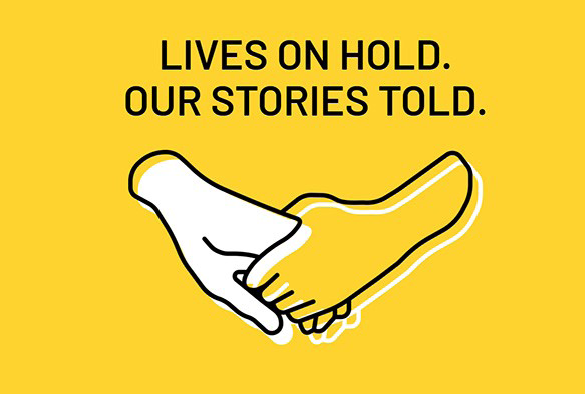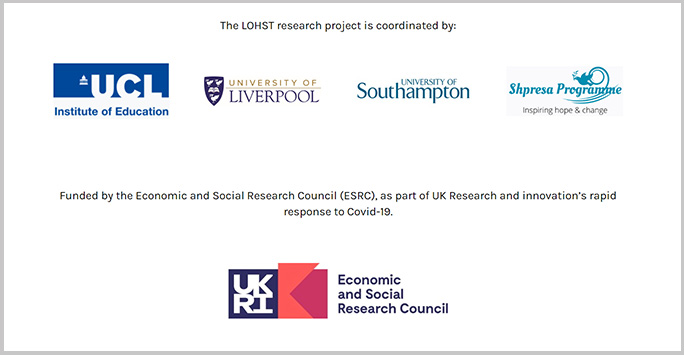
New research findings from the Lives on Hold, Our Stories Told (LOHST) project highlights failures in the UK’s legal and welfare systems and their impacts on unaccompanied young people seeking asylum.
The LOHST project, funded by the UKRI Economic and Social Research Council, is an interdisciplinary research collaboration between the University of Liverpool, University College London (UCL), the University of Southampton and civil society organisations representing the needs of unaccompanied young people seeking asylum.
Investigators on the project are Professor Helen Stalford, Head of Department at Liverpool Law School within the School of Law and Social Justice, University of Liverpool; Professor Elaine Chase, Associate Professor in Education, Wellbeing, and International Development at UCL; Dr Ingi Iusmen, Associate Professor in Governance and Policy; Dr Jana Kreppner, Associate Professor in Developmental Psychopathology at University of Southampton; and Dr William Shankley, Assistant Professor in Sociology in the School of Sociology and Social Work at University of Nottingham.
As the world experienced Covid-19, this docu-animation powerfully brings to life the unique experiences of children and young people whose lives were put on hold in the asylum system, and the profound legacies it has on their lives.
The 20-month study involved detailed interviews with 70 asylum seekers (aged 16 – 25) from 13 different countries, and with over 50 professionals from the government, legal, welfare, education, and civil society sectors. It provides the first detailed insights into young people’s experiences of the asylum process in England, during and in the aftermath of the Covid-19 lockdowns. The study exposes how Covid-19 has significantly compounded the problems that already existed within the system, leading to even lengthier delays in asylum decision-making and significant disruption to essential services such as housing, education, mental health support, and legal representation.
Uncovering the impact of Covid-19 on this issue, key insights revealed are:
- Covid-19 has compounded delays in the asylum process, with many young asylum seekers waiting in excess of 3 years for a decision. The result of this is teenagers on the cusp of adulthood losing the protections available to children whilst awaiting the outcome of their asylum application. At this point, these young people have been found to become even more vulnerable to further exploitation and modern slavery within the UK.
- During Covid-19 there was a dramatic increase in young unaccompanied asylum seekers being age-disputed – rising from 21% in 2019, to 66% in 2021. Many of these young people ended up being placed in unsuitable and often dangerous adult accommodation until they could successfully appeal.
- Excessive delays and uncertainty in the asylum process are having a serious, detrimental impact on young asylum seekers’ mental health and wellbeing.. A high proportion take medication for their mental health, and a number of interviewees detail having contemplated or attempted suicide. The growing mental health crisis among unaccompanied young people seeking asylum is exacerbated by limited access to mental health services; by being placed in unsuitable, often isolated accommodation; and by their lack of social and family networks.
- Since Covid-19, statutory and legal services are struggling more than ever to deal with the backlog and to provide the specialist support needed by unaccompanied young people seeking asylum. Unaccompanied young people seeking asylum rely increasingly on an under-funded, and increasingly overstretched, charitable sector to meet their needs.
- Unaccompanied young people seeking asylum from Albania face particular delays, exploitation, and hostility in the UK due to increasingly negative and misleading media reporting and political opposition to their claims to asylum. Our interviews with over 40 Albanian young people reveal that their cases can be highly complex, involving a combination of labour and sexual exploitation, trafficking, cultural blood feuds, and sexual identity issues.
Speaking of the impact of the delays and disruption of front-line services on young asylum seekers caused by Covid-19, Professor Helen Stalford, Principal Investigator, University of Liverpool, said:
“In a climate of increasing hostility towards asylum seekers, this research shines a light on the challenges and distress experienced by vulnerable unaccompanied children and young people. Their powerful and brave accounts offer unique insights into how the known shortcomings of the UK’s asylum processes have been compounded by Covid-19. The fact that so many young asylum seekers face age assessment and reach adulthood before their claims are processed raises serious questions about the value and effectiveness of existing children’s rights protections for immigrant children.”
The findings of the project will inform concrete legal, policy, and practice proposals which will prove essential in safeguarding these children and ensure their rights and welfare are upheld.
Further insights from the ‘Lives on Hold: Our Stories Told’ project will be available from 26th January 2023. Additional information on the project and its motivations can be found on www.livesonhold.org.

The LOHST research project is coordinated by UCL Institute of Education, University of Liverpool, University of Southampton, and Shpresa Programme. It is funded by the Economic and Social Research Council (ESRC), as part of UK Research and Innovation’s rapid response to Covid-19.